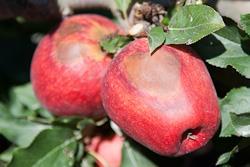
New Zealand’s pomefruit industry is looking to the future impacts of climate change on the sector, with water and biosecurity two of the leading concerns for growers, according to peak body Pipfruit New Zealand.
Average temperatures are expected to rise in the country’s main apple-producing regions by around 2°C in the next 50-100 years, according to an article in the body’s March edition of its Pipfruit Newz newsletter.
Rainfall is also expected to fall in the North Island, while levels in the South Island may rise slightly.
“The increase in temperature is likely to see a southward movement of insects and the conditions for them to increase population size rapidly,” warned Dr Mike Butcher, Pipfruit New Zealand’s technical manager and author of the article.
“Species present overseas currently will have a greater opportunity to survive and become established in New Zealand.”
Regulation of irrigation and water use will become increasingly important, Mr Butcher wrote, as will managing crop heat stress.
Breeding new varieties able to cope with hotter and drier conditions is also critical, he said, particularly varieties with low chill requirements.
“If breeding programmes are going to be of value and investment-worthy, then just creating another red, green or bicoloured fruit isn’t where it will succeed – it will be on the ability to incorporate crop survival mechanisms,” he stated.



